Land Where No One Ever Dies: An Italian Folk Tale of Mortality
Temps de lecture: 11 min
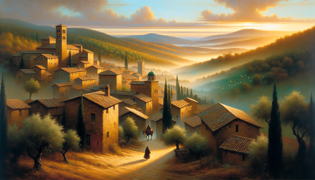
À propos de l'histoire: Land Where No One Ever Dies is a from italy set in the . This tale explores themes of and is suitable for . It offers insights. A folk tale on the theme of mortality.
Introduction
In a secluded valley of Umbria, shrouded by pear trees and the echo of lace curtains in wooden windows, folk spoke of a strange domain where no one ever died. A pilgrim, clad in a dusty cloak as steadfast as an olive tree, ventured forth to seek this whispered Eden. His boots crunched upon ancient stones, each footfall unearthing memories of bygone travelers whose prayers still lingered in the keys of rusted doorbells. Mamma mia, thought the pilgrim, never had he encountered a promise so deliciously absurd.
The path wound between sunbaked walls and spindly vines, where shadows danced like moths to a flame. The air smelled faintly of rosemary and baked bread, a scent both comforting and uncanny. When the pilgrim paused, he heard the distant chorus of church bells—soft peals drifting like silver ribbons across a dawn-lit sky. Per carità, he whispered, if this place truly existed, what manner of miracle kept age at bay?
Legends spoke of children who strode beside grizzled elders with equal vigour. They said laughter here was as endless as the horizon and tears never stained mossy steps. Some claimed the earth itself refused to reclaim its own, turning fate aside with a grace like a crumbling fresco restored by an unseen hand. The pilgrim pressed on, heart hammering like a festival drum, senses alight as if each blade of grass carried a secret tale. Soon enough, he crested a low rise and beheld a settlement nestled like a jewel in the valley’s palm. Terracotta roofs gleamed, and in that moment, hope and dread intertwined as tightly as lovers beneath a balcony.
The Whispering Olive Grove
At the valley’s edge, an ancient olive grove stretched like a silent amphitheatre. Gnarled branches reached skyward, leaves shimmering as though each were a tiny mirror. The pilgrim paused beneath one venerable trunk, its bark rough as weathered parchment and streaked with silvery lichen. The olives carried a subtle tang of brine, mingled with a whisper of sage. He touched the bark, and it seemed to pulse under his fingertips, as though the tree itself retained the heartbeat of ages.
A gentle breeze, soft as silk, unfurled through the grove. It carried a sotto voce murmur, like the low notes of a distant harp. Each rustle spoke secrets older than any living man. He pressed an ear to a knotted root and fancied he heard laughter, memories of villagers who had danced beneath moonlit ovens akin to lively hearth-fires. The air bore faint scents of crushed herbs and sun-warmed earth. A cricket’s trill answered with a patient lullaby.
Legends told of pilgrims and merchants who sought shelter there, only to emerge decades later with untouched hair and unlined faces. They bore gifts of woven baskets and tales of feasts under star-strewn skies. Some travellers grew so enamoured they refused to depart, believing life without end would banish every sorrow. Yet the grove, in its infinite hush, seemed to caution: eternity held its own peril.
The pilgrim gathered a handful of olives from a low-hanging bough and bit into one. The flesh was firm, bursting with paradoxical sweetness and earthy strength. His tongue thrilled at the flavour, and he felt a strange warmth glide through his veins like honey on a winter night. Yet beneath that delight stirred unease. How could any soul yearn for such fruit without glimpsing the ache of its core?
As he sat upon a mossy stone, the grove’s hush wrapped around him like a velvet shroud. He felt small, as if the thousand-year-old trees knew truths beyond mortal speech. The wind shifted, carrying the scent of fresh rain and wild fennel, a reminder that nature’s rhythms could not be unmade so lightly. With that thought, he rose, determined to journey deeper into this land where time seemed to pause on the breath between two heartbeats.
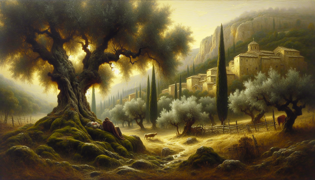
The Pilgrim's Discovery
Beyond the grove lay a moss-carpeted path lined with limestone pillars, each carved with runes worn smooth by rain and time. The pilgrim’s heart pounded like a smith’s hammer as he traced one weathered symbol—a circle embracing a star. He recalled stories of travellers drawn here by visions, guided by dreams of immortal dawns.
He rounded a bend and beheld the settlement’s first threshold: an arched gateway built of time-darkened brick. Vines of jasmine wound around its frame, perfuming the air with their sweet, heady aroma. A hush fell, broken only by the distant tolling of church bells—soft peals that seemed to mourn nothing. The pilgrim carried with him the gentle clatter of his staff on flagstones and the subtle rustle of his cloak.
Stepping through the arch, he found himself in a courtyard paved with flagstones smooth as alabaster. Figures moved within: a child chased a cat across the piazza, laughter bubbling like a fresh mountain spring; an old matron bent to light a candle before a shrine, hands steady though her hair was silvered like morning frost. Their gazes met his, warm yet quiet, as if they welcomed him as one long-expected.
A baker offered him a slice of focaccia still warm from the oven. Its crust crackled beneath his fingers, releasing the scent of yeast and olive oil. He bit into it, and the taste bloomed in his mouth like a wildflower meadow. Each morsel carried the essence of countless mornings. "Vai con Dio," the baker murmured, her voice as gentle as dawn. The pilgrim bowed in thanks, his own voice lodged somewhere between awe and disbelief.
As he wandered down narrow alleys lined with terracotta pots brimming with geraniums, he felt no weariness. Years seemed to dissolve into a single, exquisite moment. Yet in the hush of eternity, he became aware of a quiet ache at his ribs, as though his heart yearned for a shadow he could not name. The cottages bore no plaques marking births or deaths, only doorways veiled in ivy and hearts open without reserve.
In the muted glow of late afternoon, he reached a small chapel carved from living rock. Its stones exhaled a faint damp musk, the scent of history given form. He pressed a hand to the cool wall and felt the vibrations of countless prayers. Here, in this cradle of life unending, the pilgrim sensed the first tremor of doubt: was immortality a gift or a chain?
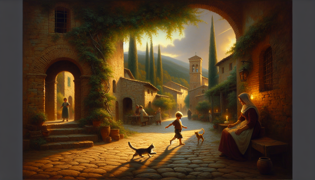
The Village of Eternal Youth
Dusk found the pilgrim at the threshold of a plaza where candle lanterns hovered like glowing fruit. He watched with mingled wonder and unease. Here, neither wrinkle nor silver strand marred any brow. Children spoke with the measured grace of elders; elders danced with the exuberance of children. Their laughter tinkled like crystal chimes in a silent cathedral.
In the square’s centre, a fountain carved from Carrara marble gurgled with crystalline water. The stream formed arabesques in the lamplight, and he stooped to drink. The liquid tasted of purest snow and carried a faint tang of mountain pine. Each swallow felt as though a veil lifted from his lungs, granting him breath unending.
A young girl offered him a fig, her voice as soft as twilight. He bit into the fruit, its flesh warm and sweet, red as a crimson dawn. Its seeds popped beneath his teeth like tiny fireflies. The pilgrim felt a curious stirring—a desire to linger, to cast aside all memory of home and hearth. “Mamma mia,” he muttered, recalling tales of ancient kin.
Yet as the night deepened, a hush fell. Shadows stretched like living forms, and the children ceased their games. The lamplight seemed to flicker with a heartbeat of its own. He imagined the quiet resting not on peace but on suspended agony: hearts trapped in endless motion, never to find the soft comfort of final rest.
A matron approached, her eyes deep as mountain pools. She traced the fountain’s basin with a slender finger, murmuring a lullaby in a dialect he could scarcely grasp. He leaned closer and smelled the faint trace of lavender and beeswax. She spoke of sacrifices made by the land—of souls held aloft by an unseen force, unable to yield to the sweet surrender of night.
The pilgrim’s mind raced like a bird against a cage. He recalled the tang of rosemary, the taste of figs, the echo of church bells and the hush in the grove. He saw the gift of unending life, but also the absence of release. In his chest, a ache bloomed—an awareness that mortality lent life its deepest flavour, like bitter chamomile contrasting golden honey.
With a soft exhale, he turned from the fountain and slipped away beneath the lantern glow. The village watched in silence, faces unreadable. In that haunting stillness, the pilgrim carried with him a lesson older than the stones beneath his feet: that to live without end was to lose life’s sweetest promise.
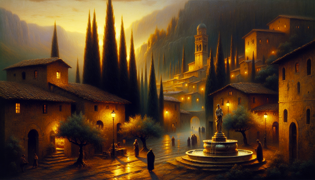
The Choice at Dusk
As evening’s violet fingers brushed the valley, the pilgrim found himself upon a stony ledge overlooking the settlement. The air tasted of rain yet to fall and pine resin warmed by sunset. He heard the distant popping of a hearth-fire, the crackle of burning olive branches. A lone nightingale sang, its melody trembling like a sigh between worlds.
Before him stood a pilgrim much like himself, though robes immaculate and hair unlined. The stranger offered a bowl of water perfumed with bergamot. He drank and saw visions swirl within: years folding like pages in a weathered tome, memories slipping from his grasp like wet petals. He felt arms heavy with the weight of countless tomorrows.
The stranger spoke without moving lips, his words forming as gentle breezes against the pilgrim’s mind. He said, “Remain, and you shall wander these lanes for eternity, your steps unwearied. Yet know that joys shall dull, and sorrows unchanging shall etch themselves into every moment.” His tone was neither cruel nor kind, but as impartial as a mountain’s shadow.
Thunder grumbled in the distance and the sky wept faint rivulets against the terracotta tiles. The pilgrim felt the chill of finite years beckoning him home. He saw his own village, children at play in dusty courtyards, a wife perched by a spinning wheel. He smelled her hair, warm as ripened wheat, heard her laughter echoing in sunlit rooms.
Tears glistened upon his lashes. With the sky’s hush for witness, he offered the bowl back. “Per me, the gift of end is sweeter,” he whispered. The stranger inclined his head, and in that motion the valley seemed to shudder. Lanterns winked out, fountains stilled, olives wilted upon their branches.
The pilgrim rose and took his first step away, heart thrumming like a lark newly released. The nightingale’s song turned jubilant. He felt each breath as precious as dew on grass, each heartbeat a sonnet to the dawn. In embracing the shape of time, he discovered that mortality itself was the land where life truly thrived.
Behind him, the valley faded into mist and legend. Before him, the winding path beckoned, alive with promise and dusk’s soft glow. He carried from that place a truth as enduring as any tale: that to live is to taste each moment’s bittersweet sweetness, and in the final exhale, to find the last laugh.
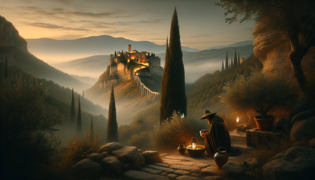
Conclusion
Dawn’s first light found the pilgrim upon a narrow track winding back toward his homeland. The air was redolent of wild rosemary and damp earth, a gentle benediction for the road ahead. Each step echoed with the memory of olives’ whisper, fountains’ lullaby, and lantern-flicker shadows that once held the promise of endless days. He recalled the hush that followed the villagers’ immortal mirth—a hush that spoke more of longing than of peace.
In his palm he cradled a single olive, firm and droplet-draped by morning dew. Its bitterness reminded him of the tender ache of parting and the sweetness that comes only to hearts that beat toward a final farewell. He lightly pressed it to his lips, tasting the paradox of life’s brevity and the vibrant pulse it bestowed. The nutty flesh was a sonnet on the tongue, each note harmonising with the memory of laughter and candlelit lullabies.
Fields of poppies stretched before him, their scarlet faces nodding in encouragement. He lifted his gaze to hills crowned with cypress silhouettes. A distant bell tolled, resonant and free of sorrow, as if declaring that endings were but prologues in a grander design. In that moment the pilgrim understood that mortality, fleeting as a bird’s song at dawn, cast every heartbeat in gold and shadow.
He strode forward with unburdened heart, carrying the valley’s lesson like a lantern in his soul. For to live without end was to lose life’s keenest edge, and to embrace the last breath was to taste existence in its fullest measure. Thus he vanished among rolling fields, a man reborn by wisdom stolen from a land where no one ever dies.
And though his story passed from lips to lips like a cherished relic, the pilgrim’s choice endured beyond the ages: that life’s sweetest gift lies in its fleeting glow, and in every goodbye resides the promise of new dawn.

















